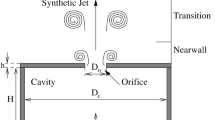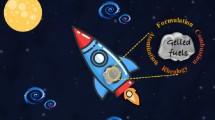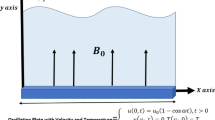Abstract
The optimal performance of heat-driven binary separation processes with linear phenomenological heat transfer law (q∝Δ(T −1)) is analyzed by taking the processes as heat engines which work between high- and low-temperature reservoirs and produce enthalpy and energy flows out of the system, and the temperatures of the heat reservoirs are assumed to be time- and space-variables. A numerical method is employed to solve convex optimization problem and Lagrangian function is employed to solve the average optimal control problem. The dimensionless entropy production rate coefficient and dimensionless enthalpy flow rate coefficient are adopted to indicate the major influence factors on the performance of the separation process, such as the properties of different materials and various separation requirements for the separation process. The dimensionless minimum average entropy production rate and dimensionless minimum average heat consumption of the heat-driven binary separation processes are obtained. The obtained results are compared with those obtained with the Newtonian heat transfer law (q∝Δ(T)).
Similar content being viewed by others
References
Bejan A. Entropy generation minimization: The new thermodynamics of finite-size devices and finite-time processes. J Appl Phys, 1996, 79(3): 1191–1215
Chen L, Sun F, Wu C. Finite time thermodynamics optimization or entropy generation minimization of energy systems. J Non-Equilib Thermodyn, 1999, 24(3): 327–359
Berry R S, Kazakov V A, Sieniutycz S, Szwast Z, Tsirlin A M. Thermodynamic Optimization of Finite-time Processes. Chichester: John Wiley & Sons Ltd., 1999
Chen L, Sun F. Advances in Finite Time Thermodynamics: Analysis and Optimization. New York: Nova Science Publishers, 2004
Chen L. Finite time Thermodynamic Analysis of Irreversible Processes and Cycles (in Chinese). Beijing: Higher Education Press, 2005
Wu F, Chen L, Sun F, Yu J. Finite time Thermodynamic Optimization of Stirling Engine (in Chinese). Beijing: Chemical Industry Press, 2008
Wang J, He J, Mao Z. Performance of a quantum heat engine cycle working with harmonic oscillator systems. Sci China Ser G-Phys Mech Astron, 2007, 50(2): 163–176
Song H, Chen L, Sun F. Optimal configuration of a class of endoreversible heat engines for maximum efficiency with radiative hat transfer law. Sci China Ser G-Phys Mech Astron, 2008, 51(9): 1272–1286
Xia D, Chen L, Sun F. Optimal performance of a generalized irreversible isothermal chemical potential transformer. Sci China Ser B-Chem, 2008, 51(10): 958–970
Curzon F L, Ahlborn B. Efficiency of a Carnot engine at maximum power output. Am J Phys, 1975, 43(1): 22–24
Orlov V N, Berry R S. Power output from an irreversible heat engine with a nonuniform working fluid. Phys Rev A, 1990, 42(6): 7230–7235
Shu L, Chen L, Sun F, Wu C. Thermodynamic optimization of distillation, separation, drying and reaction processes and devices: The state of the arts. Int J Energy, Environ Econo, 2006, 12(4): 203–214
Mullins O C, Berry R S. Minimization of entropy production in distillation. J Phys Chem, 1984, 88(4): 723–728
Brown G R, Snow S, Andresen B, Salamon P. Finite-time thermodynamics of a porous plug. Phys Rev A, 1986, 34(4): 4370–4379
Kazakov V A, Berry R S. Estimation of productivity, efficiency, and entropy production for cyclic separation processes with a distributed working fluid. Phys Rev E, 1994, 49(4): 2928–2934
Tsirlin A M, Kazakov V A, Zubov D V. Finite-time thermodynamics: Limiting possibilities of irreversible separation processes. J Phys Chem A, 2002, 106(45): 10926–10936
Schaller M, Hoffmann K H, Rivero R, Andresen B, Salamon P. The influence of heat transfer irreversibilities on the optimal performance of diabatic distillation columns. J Non-Equilib Thermodyn., 2002, 27(3): 257–269
Koeijer G D, Rosjorde A, Kjelstrup S. The role of heat exchangers in optimum diabatic distillation columns. Proc ECOS2002, 2002, Berlin, Germany. 437–445
Koeijer G D, Rosjorde A, Kjelstrup S. Distribution of heat exchange in optimum diabatic distillation columns. Energy The Int J, 2004, 29(12–15): 2425–2440
Jimenez E S, Salamon P, Rivero R. Optimization of a diabatic distillation column with sequential heat exchangers. In: Rivero R, Monroy L, Pulido R, Tsatsaronis G, eds. Proc ECOS2004,, Guanjuato, Mexico. Vol.1, 179–188
Shu L, Chen L, Sun F. Performance optimization of a diabatic distillation column by allocating sequential heat exchanger inventory. Appl Energy, 2007, 84(9): 893–903
Orlov V N, Berry R S. Estimation of minimal heat consumption for heat-driven separation processes via methods of finite-time thermodynamics. J Phys Chem, 1991, 95(14): 5624–5628
De Vos A. Efficiency of some heat engines at maximum power conditions. Am J Phys, 1985, 53(6): 570–573
Gordon J M. Observations on efficiency of heat engines operating at maximum power. Am J Phys, 1990, 58(4): 370–375
Chen L, Bi Y, Wu C. Unified description of endoreversible cycles for another linear heat transfer law. Int J Energy, Environ Econo, 1999, 9(2): 77–93
Chen L, Sun F, Wu C. Optimal expansion of a heated working fluid with phenomenological heat transfer. Energy Convers Mgmt, 1998, 39(3/4): 149–156
Chen L, Sun F, Wu C. Effect of heat transfer law on the performance of a generalized irreversible Carnot engine. J Phys D: Appl Phys, 1999, 32(2): 99–105
Chen L, Zhou S, Sun F, Wu C. Optimal configuration and performance of heat engines with heat leak and finite heat capacity. Open Sys Inform Dynam, 2002, 9(1): 85–96
Chen L, Zhu X, Sun F, Wu C. Optimal configurations and performance for a generalized Carnot cycle assuming the heat transfer law Q∝(ΔT)m. Appl Energy, 2004, 78(3): 305–313
Sieniutycz S, Kuran P. Modeling thermal behavior and work flux in finite-rate systems with radiation. Int J Heat Mass Transfer, 2006, 49(17–18): 3264–3283
Song H, Chen L, Li J, Sun F, Wu C. Optimal configuration of a class of endoreversible heat engines with linear phenomenological heat transfer law [q ∝ Δ (T −1)]. J Appl Phys, 2006, 100(12): 124907
Song H, Chen L, Sun F. Optimal expansion of a heated working fluid for maximum work output with generalized radiative heat transfer law. J Appl Phys, 2007, 102(9): 094901
Chen L, Li J, Sun F. Generalized irreversible heat-engine experiencing a complex heat-transfer law. Appl Energy, 2008, 85(1): 52–60
Li J, Chen L, Sun F. Heating load vs. COP characteristic of an endoreversible Carnot heat pump subjected to heat transfer law q ∝ (ΔT n)m. Appl Energy, 2008, 85(2–3): 96–100
Author information
Authors and Affiliations
Corresponding author
Additional information
Supported by the Program for New Century Excellent Talents of China (Grant No. NCET-04-1006) and the Foundation for the Author of National Excellent Doctoral Dissertation of China (Grant No. 200136)
Rights and permissions
About this article
Cite this article
Shu, L., Chen, L. & Sun, F. The minimum heat consumption for heat-driven binary separation processes with linear phenomenological heat transfer law. Sci. China Ser. B-Chem. 52, 1154–1163 (2009). https://doi.org/10.1007/s11426-009-0066-3
Received:
Accepted:
Published:
Issue Date:
DOI: https://doi.org/10.1007/s11426-009-0066-3




